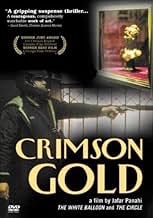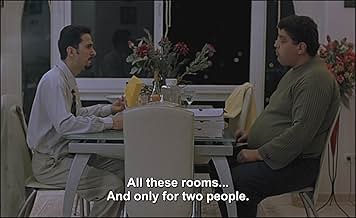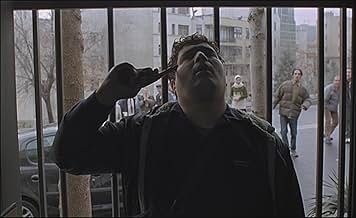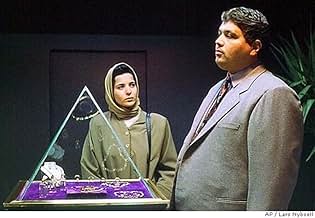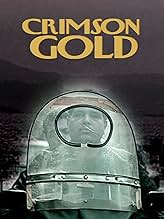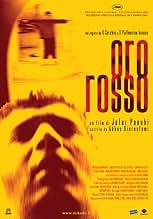IMDb रेटिंग
7.4/10
5.6 हज़ार
आपकी रेटिंग
अपनी भाषा में प्लॉट जोड़ेंAn Iranian pizza delivery man sees the worst of corruption and social unbalance in his city and is driven to crime.An Iranian pizza delivery man sees the worst of corruption and social unbalance in his city and is driven to crime.An Iranian pizza delivery man sees the worst of corruption and social unbalance in his city and is driven to crime.
- पुरस्कार
- 4 जीत और कुल 2 नामांकन
फ़ीचर्ड समीक्षाएं
Crimson Gold, one of the best films of the year, is absolutely stunning from start to finish. It's gritty and captures the essence of the social struggles in Iran while consistently delivering messages on the struggles we all face in life regarding love and relationships. It's a humanistic film that is extremely subtle, which turned off several viewers (as does Taxi Driver, one of my all-time favorites). Jafar Panahi's slow pacing doesn't allow the film to go into incoherent territory, but again, some viewers may be turned off by this. The pacing is really what allows the messages to set in and provoke the viewers thoughts. It's worth every second of your time, don't miss this gem.
9/10
9/10
This is a bit of a dream team coming together for a recent iranian film: Kiarostami writes and Panahi directs. And the film is an appropriate hybrid. It has the sloow, thoughtful, gritty realistic, real-life dialogue laden, meandering-but-focused story that Kiarostami makes, along with the focus on social injustice that Panahi had in the Circle.
It's on the top ten for Iranian film which means definitely get it. Great film. Great photography. Lots of teheran and iranian morality police -- cool. If you can't stand movies that don't have a clear Hollywood plot -- if you don't like art house movies -- if you get bored or tired in slow movies -- don't rent it.
It's on the top ten for Iranian film which means definitely get it. Great film. Great photography. Lots of teheran and iranian morality police -- cool. If you can't stand movies that don't have a clear Hollywood plot -- if you don't like art house movies -- if you get bored or tired in slow movies -- don't rent it.
Winner of the Jury Award at the 2003 Cannes Film Festival but sadly banned in Iran, Jafar Panahi's Crimson Gold shows the growing chasm in Iran between rich and poor and the psychological effects of living under a regime based on fundamentalist religion. Written by famous Iranian director Abbas Kiarostami, it is based on a newspaper account of a similar incident that took place several years ago in Tehran. The film opens inside a jewelry store where a robbery is taking place. As a crowd gathers, the robber is trapped when the security system is released and the bars close over the front door. Flashbacks then show the events that led up to the crime and the film speculates as to what might have led to this act of desperation.
Hussein (Hossain Emadeddin), an alienated heavy set man who hides his emotions, is a pizza deliveryman in Tehran who takes cortisone shots to relieve the pain of injuries sustained in the Iran-Iraq War. He is engaged to be married to his friend Ali's (Kamyar Sheissi) sister but they communicate little. Ali is a thief who snatches women's purses but is an amateur bungler who rarely scores a big take. On examining the contents of a purse with Hussein at a restaurant, they discover the receipt for an expensive necklace and their fascination leads them to visit the jewelry store where it was purchased. When the owner refuses to let them in the store because of their dress, resentment boils.
Another incident reinforces this hurt. Hussein is forced by security police to wait outside a building as they arrest people attending a party for allegedly violating the social code of the regime that prohibits men and women from dancing together. Though he good-naturedly hands out pizzas to the police and the detainees waiting outside the building, he is upset at the manner in which he is treated. A bizarre final sequence raises Hussein's anger to the breaking point. He delivers a pizza to a lavish penthouse apartment where he is invited in by the wealthy tenant (Pourang Nakaheal), a young man who recently returned to Iran after staying with his parents in the U.S. The man, who appears to be lonely, talks incessantly, complaining about the "city of lunatics" he has returned to. As the young man chats on the cell phone, Hussein wanders through the house amazed at its affluence. He finds a rooftop swimming pool and jumps in fully clothed, then sits on the roof simply gazing at the city below. Fuming inwardly, the very next day he walks into the jewelry store with a loaded gun.
Crimson Gold bravely depicts the powerlessness of the individual in an authoritarian society, yet Hussein's emotional repressiveness and the telegraphing of the final outcome dilutes the film's tension, almost to the point of lethargy. To his credit, Panahi makes a strong statement but does not wallow in polemics, making it clear that the crime results from a combination of both social and psychological factors. Hussein is not an ordinary individual beaten down by the system but a walking time bomb, a man physically and mentally damaged by the war, uncommunicative, and humiliated by each slight, no matter how minor. Like Hussein, Panahi knows something about the feeling of being trapped and humiliated and his experience lends immediacy to the film. In 2001, the director was detained, then chained to a bench for ten hours because he refused to be fingerprinted and photographed by US authorities at JFK airport, a reminder that assaults upon human dignity are not limited to a single country.
Hussein (Hossain Emadeddin), an alienated heavy set man who hides his emotions, is a pizza deliveryman in Tehran who takes cortisone shots to relieve the pain of injuries sustained in the Iran-Iraq War. He is engaged to be married to his friend Ali's (Kamyar Sheissi) sister but they communicate little. Ali is a thief who snatches women's purses but is an amateur bungler who rarely scores a big take. On examining the contents of a purse with Hussein at a restaurant, they discover the receipt for an expensive necklace and their fascination leads them to visit the jewelry store where it was purchased. When the owner refuses to let them in the store because of their dress, resentment boils.
Another incident reinforces this hurt. Hussein is forced by security police to wait outside a building as they arrest people attending a party for allegedly violating the social code of the regime that prohibits men and women from dancing together. Though he good-naturedly hands out pizzas to the police and the detainees waiting outside the building, he is upset at the manner in which he is treated. A bizarre final sequence raises Hussein's anger to the breaking point. He delivers a pizza to a lavish penthouse apartment where he is invited in by the wealthy tenant (Pourang Nakaheal), a young man who recently returned to Iran after staying with his parents in the U.S. The man, who appears to be lonely, talks incessantly, complaining about the "city of lunatics" he has returned to. As the young man chats on the cell phone, Hussein wanders through the house amazed at its affluence. He finds a rooftop swimming pool and jumps in fully clothed, then sits on the roof simply gazing at the city below. Fuming inwardly, the very next day he walks into the jewelry store with a loaded gun.
Crimson Gold bravely depicts the powerlessness of the individual in an authoritarian society, yet Hussein's emotional repressiveness and the telegraphing of the final outcome dilutes the film's tension, almost to the point of lethargy. To his credit, Panahi makes a strong statement but does not wallow in polemics, making it clear that the crime results from a combination of both social and psychological factors. Hussein is not an ordinary individual beaten down by the system but a walking time bomb, a man physically and mentally damaged by the war, uncommunicative, and humiliated by each slight, no matter how minor. Like Hussein, Panahi knows something about the feeling of being trapped and humiliated and his experience lends immediacy to the film. In 2001, the director was detained, then chained to a bench for ten hours because he refused to be fingerprinted and photographed by US authorities at JFK airport, a reminder that assaults upon human dignity are not limited to a single country.
8cwx
It's positively amazing what you can sometimes get with non-professional actors, basically playing themselves, especially compared to the many times that real actors flub things entirely. This film follows the sad trajectory of a disaffected pizza delivery driver in Tehran, but while his journey is rooted in reality and presented, aside from the cuts from one scene to another, in something much like real time including all the boring waiting periods (and without the comforting style of similar scenes in Chinatown), the story itself is almost fantastical, probably in part because the people Hussein meets are, to no small degree, more symbolic than anything. The story is heartbreaking and the visuals held my interest without being flashy in the least. Most interestingly, director Jafar Panahi provides us with a removed, rational view of modern Iranian society even as he shows his considerable skill in unobtrusively guiding us along with one man's unfortunate journey.
In September of 1980, as pretty much the first military operation of the Iran-Iraq war by ground forces, Iraqi forces captured the border post at Shalamcheh. Shalamcheh was later to be the site of the largest battle of the war, Operation Karbala-5. A passing reference to Crimson Gold's main character, Hussein, having been at Shalamcheh is made in the film. So what's quite easy to miss here, for a casual Western viewer, is that protagonist Hussein Emadeddin, sometime pizza deliveryman, is a war veteran. An Iranian viewer would be expecting this anyway; it was a huge war that engulfed the generation that Hussein belongs to. Not that many Iranians will see this movie, all Panahi's films are banned in his homeland. Shalamcheh is a resonant name to Iranians, and now contains a war memorial which many travel to. Part of the battle involved "human waves" which is to say lightly armed men, in large quantities charging the well-fortified Iraqi positions, basically suicide attacks. There are stories during the war of young men, apparently volunteers, charging the minefields, in order to clear them for the more experienced soldiers.
The Iran Iraq war was a particularly unpleasant throwback: commentators have compared it to World War One due to the predomination of trench warfare. In both wars for example there was the use of mustard gas, machine gun nests, shelling, and barbed wire. I think it's pretty much implied that Hussein has been a victim of the war. He's been taking cortisone on a long term basis. Due to the copious side effects, you don't do that unless there's something severely amiss, he would have to have a severe long term illness. Prolonged use of cortisone can be prescribed to treat severe lung disorders, I would suggest that Hussein may well have been gassed (hundreds of thousands of Iranian soldiers were gassed by sulphur mustard during the war, plus mustard was used at Shalamcheh during Operation Karbala-5, on civilian populations as well as Iranian troops).
The side effects of long term cortisone use include insomnia irritability, depression, swelling, obesity, diabetes, and depressed immune response. At one point Hussein has to climb four stories to deliver a pizza when a lift is out of order and the tenant won't come down; in the light of his condition, this appears rather more tragic. The character is very easy to sympathise with because, Hussein Emadeddin is played by Hussein Emadeddin, also a pizza deliveryman with severe health problems. There's a lot of realism here.
When thinking of post-war art in film, the term noir floats to the surface. Noir developed as an art form, if not necessarily an aesthetic, as a response to the zeitgeist of the Second World War's aftermath. An anonymous individual from the University Of San Diego has put it better than I can: "The historical setting is the contemporary world that has been corrupted and lost its moral certainty. The prevailing cynicism of characters reflects the reality of the atomic bomb, Cold War, totalitarianism, propaganda, Hollywood blacklist, corrupting power of the government and press. World War II fragmented men, caused them to feel adrift, insecure, alienated, a feeling of having "gone soft" and lacking power to control their lives. The liberal movement was in crisis, due to powerful forces of communism and materialism, causing a loss of faith in progress and man's innate goodness."
Since the war there's been a crisis for the liberal cause in Iranian society, which is referenced at one point by Hussein's friend Ali, who asks what it was like in (pre-theocratical) times when women walked around naked (without veils). It's clear that there's not much fun in the Iran of this world, in one scene Hussein asks a fifteen-year-old policeman if he's ever had fun, the young chap isn't even sure what the word means, and I think that makes two of them.
Despite Hussein having been pretty much left on the scrapheap, rotting in a dingy apartment to the tune of squeaking rats, he's a nice guy, and tries his best to be kind to folk. However, after a series of humiliations, he has had enough and commits a hideous folly. It's a film about injustice that manages to be, at the same time, warm-hearted, staggeringly beautiful and polemical. You can really take Hussein Emadeddin into your heart. Which is rare in a cinematic world where men are often armour plated and hard to love.
My respects for a profoundly humane film. Quite ironically it appears that Jafar Panahi was arrested within the last week whilst giving a dinner party at his home, an absurdity that you might think would make a good scene in a Panahi movie.
The Iran Iraq war was a particularly unpleasant throwback: commentators have compared it to World War One due to the predomination of trench warfare. In both wars for example there was the use of mustard gas, machine gun nests, shelling, and barbed wire. I think it's pretty much implied that Hussein has been a victim of the war. He's been taking cortisone on a long term basis. Due to the copious side effects, you don't do that unless there's something severely amiss, he would have to have a severe long term illness. Prolonged use of cortisone can be prescribed to treat severe lung disorders, I would suggest that Hussein may well have been gassed (hundreds of thousands of Iranian soldiers were gassed by sulphur mustard during the war, plus mustard was used at Shalamcheh during Operation Karbala-5, on civilian populations as well as Iranian troops).
The side effects of long term cortisone use include insomnia irritability, depression, swelling, obesity, diabetes, and depressed immune response. At one point Hussein has to climb four stories to deliver a pizza when a lift is out of order and the tenant won't come down; in the light of his condition, this appears rather more tragic. The character is very easy to sympathise with because, Hussein Emadeddin is played by Hussein Emadeddin, also a pizza deliveryman with severe health problems. There's a lot of realism here.
When thinking of post-war art in film, the term noir floats to the surface. Noir developed as an art form, if not necessarily an aesthetic, as a response to the zeitgeist of the Second World War's aftermath. An anonymous individual from the University Of San Diego has put it better than I can: "The historical setting is the contemporary world that has been corrupted and lost its moral certainty. The prevailing cynicism of characters reflects the reality of the atomic bomb, Cold War, totalitarianism, propaganda, Hollywood blacklist, corrupting power of the government and press. World War II fragmented men, caused them to feel adrift, insecure, alienated, a feeling of having "gone soft" and lacking power to control their lives. The liberal movement was in crisis, due to powerful forces of communism and materialism, causing a loss of faith in progress and man's innate goodness."
Since the war there's been a crisis for the liberal cause in Iranian society, which is referenced at one point by Hussein's friend Ali, who asks what it was like in (pre-theocratical) times when women walked around naked (without veils). It's clear that there's not much fun in the Iran of this world, in one scene Hussein asks a fifteen-year-old policeman if he's ever had fun, the young chap isn't even sure what the word means, and I think that makes two of them.
Despite Hussein having been pretty much left on the scrapheap, rotting in a dingy apartment to the tune of squeaking rats, he's a nice guy, and tries his best to be kind to folk. However, after a series of humiliations, he has had enough and commits a hideous folly. It's a film about injustice that manages to be, at the same time, warm-hearted, staggeringly beautiful and polemical. You can really take Hussein Emadeddin into your heart. Which is rare in a cinematic world where men are often armour plated and hard to love.
My respects for a profoundly humane film. Quite ironically it appears that Jafar Panahi was arrested within the last week whilst giving a dinner party at his home, an absurdity that you might think would make a good scene in a Panahi movie.
क्या आपको पता है
- ट्रिवियाThe lead actor, who plays a pizza delivery man, is actually a pizza delivery man in real life. He is also a paranoid schizophrenic, which may explain some of the character's traits and behavior.
- कनेक्शनFeatured in Cinema Iran (2005)
टॉप पसंद
रेटिंग देने के लिए साइन-इन करें और वैयक्तिकृत सुझावों के लिए वॉचलिस्ट करें
- How long is Crimson Gold?Alexa द्वारा संचालित
विवरण
- रिलीज़ की तारीख़
- कंट्री ऑफ़ ओरिजिन
- आधिकारिक साइटें
- भाषा
- इस रूप में भी जाना जाता है
- Crimson Gold
- फ़िल्माने की जगहें
- तेहरान, ईरान(location)
- उत्पादन कंपनी
- IMDbPro पर और कंपनी क्रेडिट देखें
बॉक्स ऑफ़िस
- US और कनाडा में सकल
- $1,48,959
- US और कनाडा में पहले सप्ताह में कुल कमाई
- $13,476
- 18 जन॰ 2004
- दुनिया भर में सकल
- $4,00,768
इस पेज में योगदान दें
किसी बदलाव का सुझाव दें या अनुपलब्ध कॉन्टेंट जोड़ें



